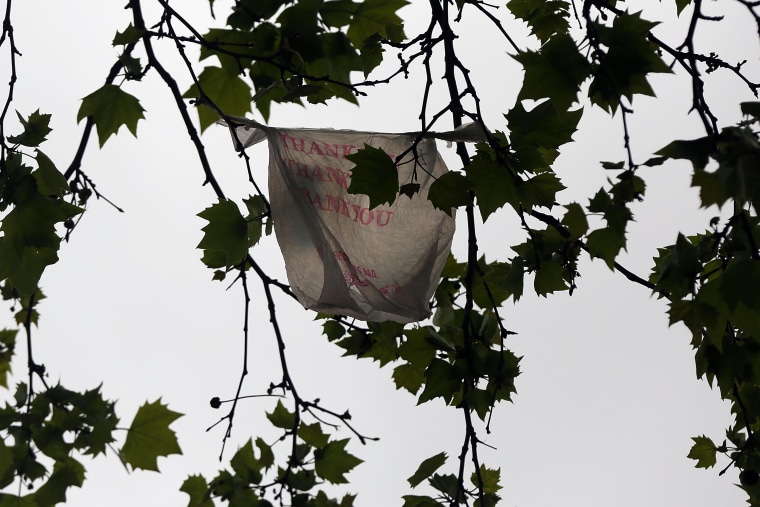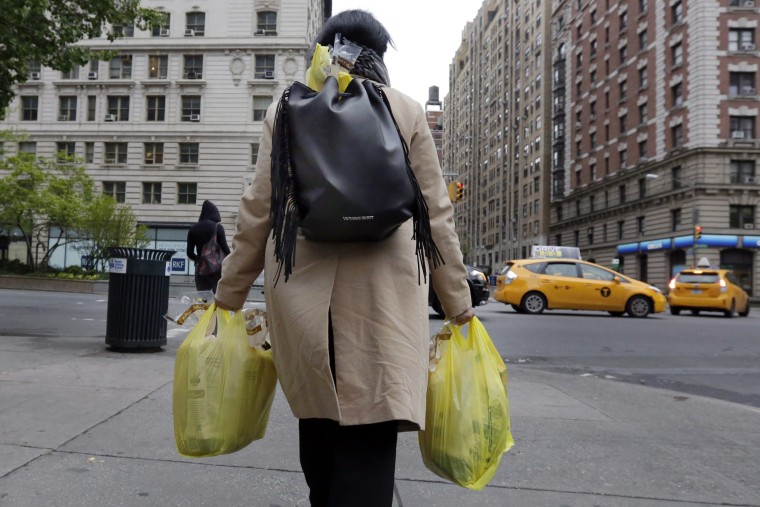It’s the customers who buy newspapers — at least some of them — that really tick off Angela Zhou, the owner of a mom-and-pop convenience store on Grand Street on Manhattan's Lower East Side, a neighborhood near Chinatown.
“A newspaper simply does not need to be put in a plastic bag,” Zhou told NBC News, speaking in Mandarin. “They do it in order to bring home a few extra bags, for instance to use for garbage.”
“It’s glaringly staring at you. You can’t miss it in the trees, you can’t miss it in the garbage cans, and if you drop it on the floor, you see it all over Chinatown. That is littering.”
For decades, plastic bags like the ones Zhou hands out have been a free entitlement with purchases at New York City fruit and vegetable stands, grocery stores, and supermarkets. Thrifty New Yorkers often save the bags, shoving them under the sink or into pantry closets, to be reused to line garbage cans, pick up after the dog, or carry items a short distance.
But beginning Oct. 1, New York could join a growing list of U.S. cities, including Seattle, San Francisco, and Los Angeles, that have enacted laws to curb such behavior. While New York City’s bill, which the City Council passed on May 5, does not impose a tax, it does require certain stores to collect at least five cents for each carryout bag given to customers.
Margaret Chin, one of the bill’s main sponsors, told NBC News that the measure would help reduce the 10 billion plastic bags New Yorkers toss out each year by between 60 and 90 percent. The fee would apply to paper bags as well, since their production also impacts the environment, supporters of the bill say. This would dissuade customers from simply switching from plastic to paper.
“The goal of the bill is not to charge people anything,” Chin, a Democrat whose council district includes Chinatown, the neighborhood where she grew up, said. “The goal is to have everyone work together and see that they can also take part in protecting our environment, and to stop and think whether they need that plastic bag when they buy something from the store.”
RELATED: 'I'm Not Afraid to Speak Out': How Margaret Chin Found Her Voice
Wellington Chen, executive director of the Chinatown Partnership Local Development Corporation, told NBC News he supports the bill and said it would help rid Lower Manhattan of the ubiquitous red bags, a color symbolizing good fortune in Chinese culture, that are often strewn along the streets.
“It’s glaringly staring at you,” Chen said, referring to the red bags. “You can’t miss it in the trees, you can’t miss it in the garbage cans, and if you drop it on the floor, you see it all over Chinatown. That is littering.”
In interviews this month, several Asian-American retailers and shoppers in Chinatown told NBC News that they welcome the bag fee, saying it’s good for the environment, though some expressed concerns about shops that might flout the rules. New York City Mayor Bill de Blasio has indicated he will sign the bill into law, which would fine non-compliant store owners, but it remains unclear when the signing would happen.
Former Mayor Michael Bloomberg first introduced the idea of a bag fee back in 2008, but it failed to gain traction in the City Council. The current bill, originally calling for a minimum charge of a dime, passed narrowly in the City Council 28-20 after two years of debate. Meanwhile, the New York State Assembly and Senate introduced their own legislation to bar the city from imposing fees or taxes on bags. A state law would trump a city one.
State Assemblyman Ron Kim, a Democrat whose Queens district includes Flushing, home to many Chinese and Korean Americans, told NBC News he doesn’t believe the council’s bill is the best way to curtail the use of plastic bags. Each year, the city collects 91,000 tons of paper and plastic carryout bags and spends $12.5 million annually disposing of them outside the five boroughs, according to the Sanitation Department.
“I agree with the intent behind the members of the City Council, but I think the outcome is not what we want,” said Kim, adding that he believes the bill punishes low income and poor families.
RELATED: Ban the Bag? Why Plastic Bag Taxes and Bans Don't Always Work
Unlike the bag fee in Washington, D.C., which is a tax to fund cleaning the Anacostia River, New York City’s will direct the change into the pockets of retailers. Kim, however, said he would prefer to see the money generated from the fee reallocated to the consumer, instead of given to store owners, or put into a fund for environmental protection.
For Zhou, the Lower East Side store owner, the fee can help offset the hundreds of dollars she said she spends each month buying lightweight red plastic bags.
But she’s still worried.
“If our store implements the law and collects a fee, but if the rest of the stores haven’t, then people will say, ‘Why are you so cheap,’ and, ‘I’ll go somewhere else to buy my stuff,’” Zhou said. “Some people are like that.”
“If our store implements the law and collects a fee, but if the rest of the stores haven’t, then people will say, ‘Why are you so cheap,’ and, ‘I’ll go somewhere else to buy my stuff.’ Some people are like that.”
If signed into law, the bill would take effect on Oct. 1, and retailers would have until next April to comply before being fined. The fee would apply to bags provided at convenience, grocery, and apparel stores, as well as supermarkets and pharmacies, among others. Those exempt would include restaurants, food vendors, and state-regulated liquor stores.
A fee would not be charged for small handleless bags, like those at supermarkets that customers use for produce, meats, and seafood, and New Yorkers paying with food stamps would be exempt. Retailers who don’t follow the law would be fined $250 for a first offense and $500 for subsequent violations.
The bill also requires the city to advertise the bag-fee program in newspapers, public places, and on radio, and to distribute reusable carryout bags with a focus on low-income New Yorkers below 200 percent of the federal poverty line.
RELATED: China's new revolution: Ban on plastic bags
For many Chinese, particularly immigrants who came to New York within the last decade, having to pay for plastic bags is nothing new. In 2008, China made that a requirement for supermarkets, department stores, and shops, while also banning thin, cheaply produced plastic bags in an effort to fight pollution.
Speaking in Mandarin, Annie Wang, who works in Chinatown and lives in Brooklyn, told NBC News she believes the city’s bag fee is reasonable. “This way people won’t pollute the environment,” she said. “It’s best if you have one of those bags you bring yourself.”
Wang, who is from China and has lived in the U.S. for almost 10 years, said she has a pull-bag on wheels that she uses when she buys fruits and vegetables, a common sight in Chinatown. And if she had to make a stop at the supermarket without her pull-bag, she’s fine with shelling out a nickel or a dime to buy a plastic or paper bag, she said.
For Michelle Lin, a 25-year-old who lives in the Bronx and works on Broome Street, the bag fee is similar to when the Metropolitan Transportation Authority began charging customers a dollar every time they purchased a new Metrocard, a ticket made from plastic that straphangers swipe at turnstiles.
“When it just started, I hated it,” she said, “even though I still pay for it sometimes.”
About the bag fee, Lin added, “It’s something that once people get used to, it’s pretty good. It’s good for the environment.”
Like Wang, Lin is accustomed to the bag fees in China, where she was born and returns every now and then. Sometimes, though, she has to remind herself to bring bags when she goes out shopping.
“It’s a little awkward when you go back there, but it's understandable,” she said.

Plastic bags, including the ones in red, were not always part of the shopping experience in New York’s Chinese-American communities. Chin, the councilwoman who sponsored the city’s bag-fee bill, said she doesn’t remember them ever being given out at markets as a kid growing up in Chinatown during the 1960s. Back then, she said, most items were wrapped in paper.
Chen, the executive director of the Chinatown Partnership, had a similar recollection. He came to New York after leaving Hong Kong in 1970, nearly a decade before plastic shopping bags were first introduced into American stores.
“There was none of that culture,” he said.
But for Kim, the bag fee is personal. The 37-year-old assemblyman, who is Korean American, said he and his wife grew up saving plastic bags that, like many Asian-American families, they reused in an effort to be frugal.
“But now these families that are going through the same exact experiences are being punished,” he said.
Follow NBC Asian America on Facebook, Twitter, Instagram, and Tumblr.
